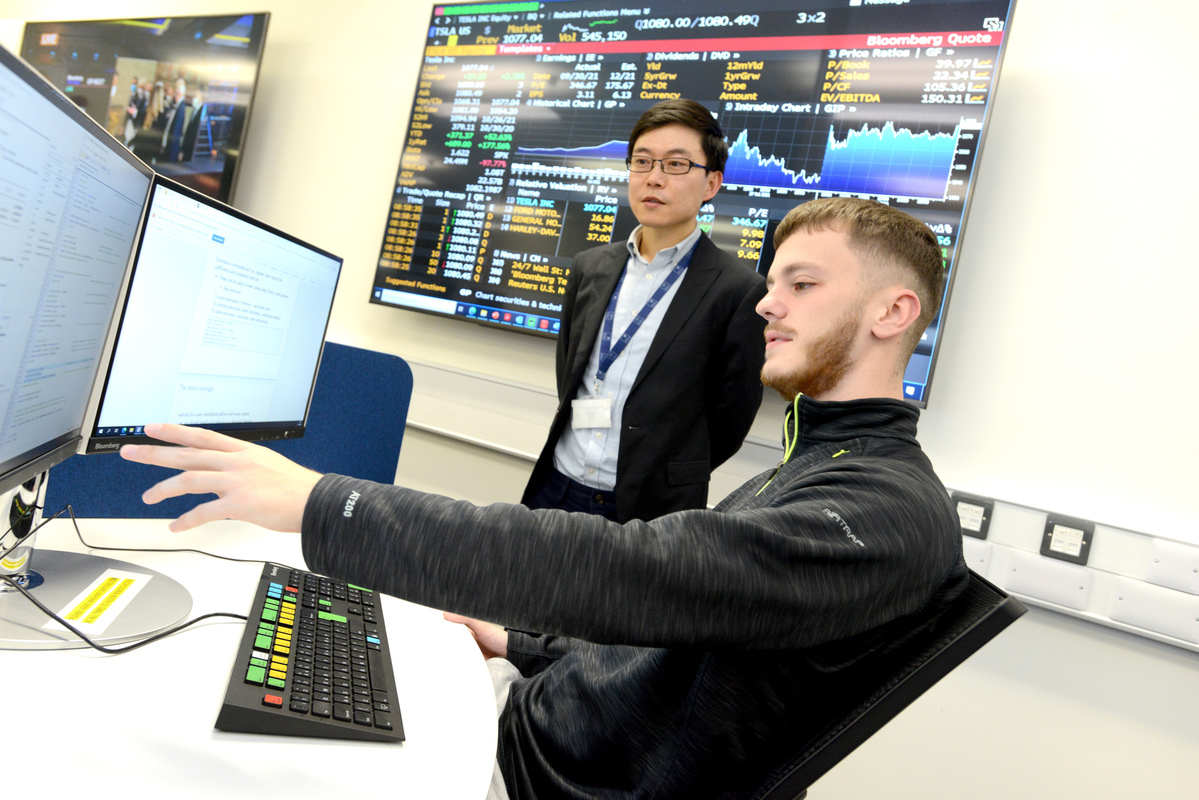Module Overview
In the last couple of decades the banking industry was at the heart of dramatic changes, including deregulation, financial innovation and globalization. This module is designed to examine these developments and their effects on the banking sector. The module continues by providing students with the opportunity to analyse contemporary issues in banking that emerged as responses to these global developments. These issues include the provision of credit and in particular credit rationing, securitization of debt, and competition and mergers in the banking sector.
Module Overview
This module is designed to make students aware of international financial markets and institutions. The need for financial markets and institutions is the underlying scope of the module and students have the opportunity to investigate this importance for their own countries.
Module Overview
This module is designed to introduce the principles and methods for statistical and econometric modeling. It provides students with the opportunity to develop the fundamental skills of using econometrics software packages that are essential for students who wish to pursue further studies or a professional career in economics, finance or related disciplines. Real-world data can be used in this module to help students to develop problem-solving skills.
Module Overview
The purpose of the module is to familiarise and develop students’ awareness and ability to command the various initiatives and tools within finance. The focus will be the introduction of the regulatory environment and requirements to “practice”, which will enhance employability of students. Sections of the learning schedule are kept open to ensure that the module is teaching the most current issues in financial developments.
Technical skills are taught with the aid of computer data sources and constructs of coding, and financial mathematics, through programming software. Developments in financing methods and related articles will also be introduced and explored within sessions.
The module reinforces the importance of an ethical and professional approach, through the review and knowledge of codes of conduct and various external verification techniques and enforcement mechanisms. The module is designed to give students technical ability and relevant knowledge and skills of real-world developments in finance, which is useful from an employability perspective.
Module Overview
This module aims to provide students with the opportunity to develop knowledge of the gains to be made from trading internationally. It focuses also on the gains to be made from economic integration and the globalisation process. The module also seeks to examine the main patterns of trade and exchange and aims to demonstrate how free trade can be influenced by government and the future risks of protectionism.
Module Overview
This module provides an opportunity for students to extend their understanding of macroeconomics. It emphasises the role of macroeconomics as an applied discipline, focusing on issues facing the world’s economies featured in the Financial Times. By the end students are expected to be able to use the techniques learned to interpret changing macroeconomic aggregates, events and policies.
Module Overview
This module focuses upon the primary statement of roles which participants in the financial landscape provide. These roles are central to the idea of money and role which it plays in the modern landscape in terms of the flow of funds as a framework. The module aims to provide a brief introduction to the major participants; banks, pension funds, insurance companies and the management role of funds which they have.
Module Overview
The aim of this module is to introduce the role of the financial manager and the impact of economic environment on financial management function. The module can help students to develop abilities to evaluate, interpret, and discuss key issues surrounding investment, financing, and working capital management decisions.
The module begins by considering the financial management function and environment before introducing the time value of money and discounted cash flow allowing students to develop investment appraisal and business valuation techniques. Business finance and capital structure theories will also be considered.
As an accredited module, this can help improve your employability.
Module Overview
The aim of this module is to introduce the role of the financial manager and the impact of economic environment on financial management function. The module helps students to develop abilities to evaluate, interpret and discuss key issues surrounding investment, financing, and working capital management decisions.
The module begins by considering the financial management function and environment before introducing the time value of money and discounted cash flow allowing students to develop investment appraisal and business valuation techniques. Business finance and capital structure theories will also be considered.
Module Overview
Lincoln International Business School (LIBS) believes that an option to study overseas is a valuable educational opportunity for our students.
The optional year is intended to:
- enable students to benefit from studying similar subjects within a cross cultural environment, by exposing students to a wider academic and cultural experience;
- facilitate reflexivity in learning and personal and professional development;
- enhance their future employment opportunities by increasing their cultural and professional mobility.
This module is optional for all taught on campus undergraduate students within Lincoln International Business School. Study Abroad is a year long module which enables students to spend time studying abroad at one of the University’s approved partner institutions.
During the year spent abroad, students share classes with local students and study on a suite of locally-delivered taught modules which have been approved in advance by the University. As many partner institutions support internships it is anticipated that some students will elect to combine study (minimum one semester equivalent) with work and or a period of volunteering.
Eligible students must have completed their second year of study to a satisfactory standard (normally with an average of a 2.1 or above, dependent upon partner requirements) standard and successfully completed the application process.
Upon completion of the study period abroad, each student will be required to submit a portfolio including a reflection on the experience of living and studying in a different cultural environment and the skills acquired.
Module Overview
The LSMIF will be designed to provide students with the essential knowledge on the following main knowledge blocks - at intermediate level for Year 2:
- How stock markets work and how to read financial data
- Valuation techniques including cash flow projections, dividend growth modelling, and comparative analysis.
- Market timing and technical analysis.
- Asset allocation optimization
- Quarterly investment committee meetings with experts from the industry.
- Investment discussion meetings.
Module Overview
This module is aimed at those students who have decided to take a year out of formal studies to gain accredited work experience and are registered on a degree programme with an accredited professional practice element. The Professional Practice Year aims to give students a continuous experience of full-time work within an organisation.
It should be a three way co-operative activity between employer, student and University from which all parties benefit. Students can choose to pursue a variety of options including a placement year, a consultancy project or a work-based dissertation. Potential costs relating to this module are outlined in the Features tab.








